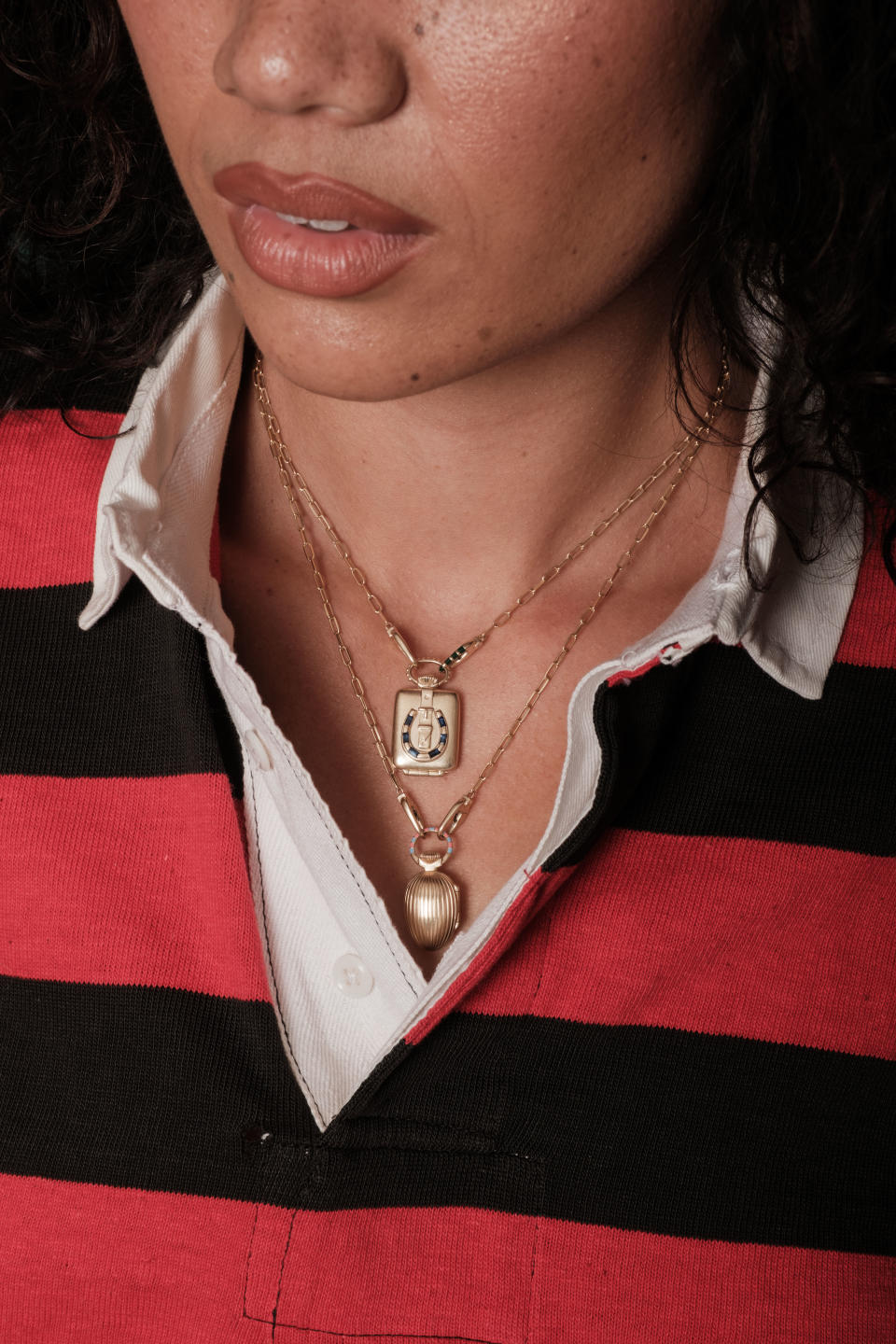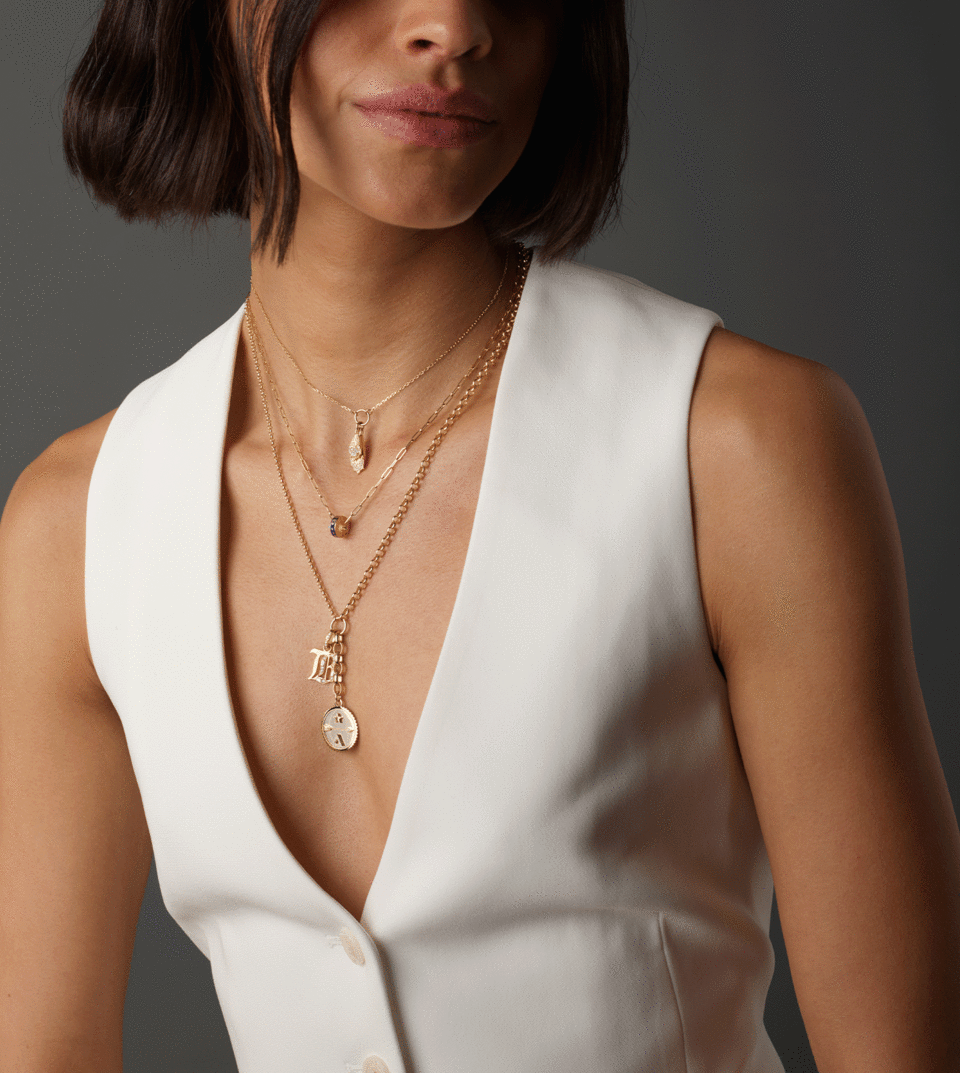What to Watch: Are Charm Necklaces the New ‘It’ Accessory?

Statement necklaces had their heyday in the 2010s, with consumers gravitating to styles with large baubles, florals, gemstones and other eye-catching details. But over the years their popularity began to wane and delicate styles reigned as the new go-to necklace. As all fashion trends tend to cycle, the statement necklace has made its resurgence recently, although now in a different style: charm necklaces.
Charm necklaces have seen a rise in popularity over the last few months, particularly customized styles, as consumers are taking to TikTok to show off their accessories. Brands like Brooklyn Charm, which has been a staple in New York City since 2010, have seen booms in business thanks to influencers and customers documenting the experience of putting together a custom charm necklace from expansive collections of charms.
More from WWD
This popularity is being seen across the accessories category, with consumers looking to costume jewelry brands and arts and crafts stores to make their own inexpensive styles, and also to higher-end brands like Foundrae, Hart Jewelry and Ben for charm necklaces that reflect their personal style.
“We’ve created tools of self-discovery and self-expression,” said Beth Hutchens, cofounder and creative director of Foundrae. “Every single part of the collection is intended to really empower the wearer and empower them in many ways because it empowers them spiritually, but it also empowers them creatively because our pieces are somewhat modular in nature, which allows everyone to create a completely unique story that reflects what’s important to them and their values. But it also helps inspire the next chapter to unfold.”

The personalization aspect of charm necklaces is a major factor in their popularity. Brands such as Foundrae, Hart Jewelry, Lingua Franca, Clare V. and others offer a large assortment of charms that allow customers to create a style that’s unique to themselves.
More in What to Watch: Tech, Sustainability, Accessories
Luxury E-commerce Players Face a Whole New Reality
The Earth Is Flatter, and Quieter
Tech Outlook for 2024
Neuroesthetics Is Poised to Shake Up Product Design
Are Charm Necklaces the New ‘It’ Accessory?
Mass Market Retailers Go Big on Lab-grown Diamonds
“People are wanting something unique that tells their story and is just unique to them,” said Hart Hagerty, founder of Charleston, S.C.-based brand Hart Jewelry. “Charms, obviously, the way you can pick and choose, it’s amazing to see how someone can choose the exact same charms as somebody else, but the way they arrange it on a chain is a completely different look, so it’s the versatility there.”
Hagerty said custom charm jewelry is the “bread and butter” of her business, which she launched in 2016. As the brand is based in the South, Hagerty explained she’s seen regional customers gravitate toward charm jewelry for some time, but is now recently seeing the popularity move into locales like New York City and Los Angeles.
She stated the brand’s “flying pig” pendant, which she said represents achieving dreams, is one of her most popular charms among customers. Hagerty also named heart pendants and letters as other top sellers.
“Charms are inherently spiritual,” she said. “They are also whimsical and there’s a playful element. There’s nostalgia baked into them. When I do my designs, I try to toe the line between something that feels timeless and also has a talismanic quality.”
Hagerty and other jewelry designers explained that customers are gravitating toward charms because of the messages they can reflect.
“A heart charm is, of course, a bestseller because that can relate to so many different experiences,” said Charlotte Macaulay, founder of fine jewelry brand Ben, who previously designed jewelry for brands like Kate Spade and Clare V. “But the novelty ones are where you get kind of the story. It is also about building a personal story and it’s just that jewelry in general has become much more of a personal statement. That’s at the forefront. It always has been that people have layered meaning, but it’s really like the headline at this point.”
This emphasis on meaning can be credited to the COVID-19 pandemic, the jewelry designers stated, as more customers are now looking to make intentional purchases that are more personal to them.
“A lot of people had life changes during that time,” Hagerty said. “A lot of people moved, people had babies, people changed their jobs and the world became a really scary place. And people started questioning what they wanted out of their lives and jewelry has this wonderful superpower, which is connecting you to your authentic self — to a higher belief system that you have.”

In 2024, the jewelry designers expect to continue to see the evolution of the charm necklace. Macaulay, who launched Ben in August, is looking to what will be the next “It” pendant following hearts. She is anticipating that the horseshoe, which symbolizes luck, will become a popular style this year.
She also believes that layered necklaces will continue in popularity, with charm necklaces serving as the main element of a wearer’s necklace stack. The designer has seen customers pair her Ben necklaces with other pieces like thin tennis necklaces, thicker chains and heirloom pieces.
“It’s kind of like that jewelry you can sleep in and that you can kind of just live your life in,” she said. “It’s a nod to the comfort of we all stopped getting dressed up [during COVID-19] and I think we’ve returned to that, of course, which is great, but jewelry has adapted to a more casual, but more meaningful everyday version, versus like a very formal statement necklace.”
The jewelry designers think that the personalized and unique nature of the accessory will continue its popularity through 2024.
“I personally don’t see it as a trend,” Hutchens said. “I see it as self-expression. It’s timeless and people will continue to build their collections, so I think that how it evolves is how a person chooses to evolve as an individual.”
Best of WWD